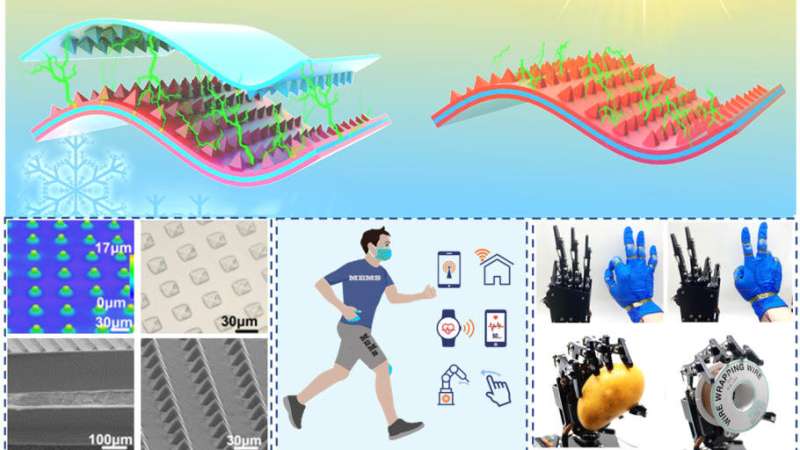
Harvesting energy from the day-to-day movements of the human body and turning it into useful electrical energy, is the focus of a new piece of research involving a Northumbria University Professor.
Academics from Northwestern Polytechnical University in China, supported by Professor Richard Fu from Northumbria, have developed a unique design for sensors capable of using human movements—such as bending, twisting and stretching—to power wearable technology devices including smart watches and fitness trackers.
Self-powered pressure sensors are one of the key components used in these smart electronic devices which are growing in popularity today. The sensors can operate without the need for external power supplies.
Detecting health conditions and measuring performance in sport are among the potential uses for these types of sensors. As a result, they are the focus of extensive research and development, but remain challenging to produce with the performance sensing, flexibility, and sufficient level of power needed for wearable technology.
A new research paper published in Advanced Science describes how the team led by Professor Weizheng Yuan, Professor Honglong Chang and Associate Professor Kai Tao from Northwestern Polytechnical University (NPU), has worked with Professor Fu to develop a solution.
Their novel method involves using sophisticated materials with pre-patterned pyramid shapes to create friction against the silicone polymer known as polydimethylsiloxane or PDMS. This friction generates a self-powering effect, or triboelectricity, which can significantly enhance the energy available to power a wearable device.
Professor Tao from NPU explained: “This results in a self-powered tactile sensor with wide environmental tolerance and excellent sensing performance, and it can detect subtle pressure changes by measuring the variations of triboelectric output signal without an external power supply. The sensor design has been tested and is capable of controlling electrical appliances and robotic hands by simulating human finger gestures, confirming its potential for use in wearable technology.”
Professor Fu added: “This self-powered sensor based on hydrogels has a simple fabrication process, but with a superb flexibility, good transparency, fast response and high stability.”
Kai Tao et al, Ultra‐Sensitive, Deformable, and Transparent Triboelectric Tactile Sensor Based on Micro‐Pyramid Patterned Ionic Hydrogel for Interactive Human–Machine Interfaces, Advanced Science (2022). DOI: 10.1002/advs.202104168
Citation:
New research harnesses the power of movement (2022, April 25)
retrieved 25 April 2022
from https://techxplore.com/news/2022-04-harnesses-power-movement.html
This document is subject to copyright. Apart from any fair dealing for the purpose of private study or research, no
part may be reproduced without the written permission. The content is provided for information purposes only.
Stay connected with us on social media platform for instant update click here to join our Twitter, & Facebook
We are now on Telegram. Click here to join our channel (@TechiUpdate) and stay updated with the latest Technology headlines.
For all the latest Technology News Click Here
For the latest news and updates, follow us on Google News.
